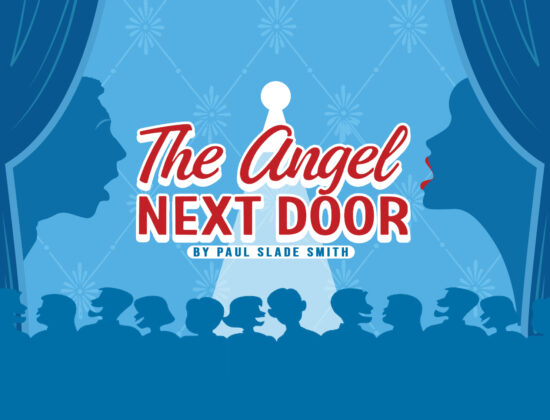‘The Musical of Musicals, the Musical’ Is a Mouthful of Fun (Solares Hill)
‘The Musical of Musicals, the Musical,” now at Waterfront Playhouse, is a musical about paying the rent. Wait a minute, isn’t “Rent” a musical?
Ah, now you’ve got it. This play is a play on Broadway’s favorite thing, the musical. And it’s a blast.
Written by Eric Rockwell and Joanne Bogart (the only out-of-towners involved), “The Musical of Musicals” is a splendid excuse for our local stage stars to go over the top.
Bruce Moore opens the show as Big Willie in “Corn,” a pastiche of “Oklahoma!” As high as an elephant’s eye, he is so full of corn. “What’s this in my tooth? A kernel of truth?” His adversary as Jud is David Black as Jidder, and the songs are vaguely familiar too, for example “I Don’t Love You.” If you can recall the Agnes de Mille choreography in the movie, you will enjoy the reference to “run of de Mille.” It’s more of a reach to hear Daylight Savings Time as the main noun in the “Oklahoma” song, but spell it out they do.
We soon slip into other Rodgers and Hammerstein musicals. “Follow Your Dream (Until You Die)” sounds awfully like the Bali Hi song in “South Pacific.” And the line, “Sometimes You Get Hit So Hard It Feels Like a Kiss,” is appallingly close to “Carousel.” Then all of a sudden we’re in “The Sound of Music” with Laurie Breakwell as a looming Mother Superior.
Next up is a supposed musical called “A Little Complex,” a dig at Stephen Sondheim. It’s set in an apartment complex where everyone is behind on the rent and in need of a psychiatrist. “We’re all going to die!” shrieks one of them. “Thank you, that was really helpful,” says a sweet but tempestuous Kristen Bussiere as the girl next door.
“Dear Abby” is a skit in the style of Jerry Herman, in other words they all have martinis. “You’re looking well, Abby, I can tell, Abby….” In this version, you is what you ain’t and you ain’t what you is.
Then on to Andrew Lloyd Webber, falling chandelier and all. “Pay your rent!” yells Black as the Phantom Jitter, who also gets to go on about “my angel, a whining, self-absorbed angel.” It’s all lovely stuff, although Moore is quite unlovely with the long black hair he assumes for, I presume, “Evita.” (Bussiere is “Juanita.”) And “Cats” gets its moment with a fine line about snoozing all day since being neutered at the age of three.
Last of the butchered musicals is “Speakeasy” (or “schpeakeasy” as the Berliners insist), an homage to “Cabaret,” a musical that is “overdone for the cognoscenti,” sing our boys and girls, “so we can pay the renti.”
The whole affair – all 95 minutes of it, although it feel like half that – is a running joke about melody. Or the lack of it, described here as the “wretched recitative.” It’s a huge excuse for puns as well: “A funny thing happened on the way to decorum;” “Hats off to decapitation.” And skillfully skewered is every kind of excruciating archness, all those overdone bits of business that can make the non-theatrical wince.
Moore is in fine voice and he is a terrific actor. David Black can do just about anything that any play calls for; he has a great leap (called for throughout) and in the “Cats” episode he was purrfect at coughing up a hair ball. Bussiere is entirely engaging in both her sincerity and in her mugging, and she has one of the best hops (called for throughout, forward and backwards). And Breakwell is, alarmingly, the real thing in the Norma Desmond episode, her head tossed back and the eyeballs rolling even further.
Ably accompanying the company on piano is Michael Fauss, keeping the whole thing together with his energy and timing. The set design (basically – and cleverly – one giant frame inside another) is of course by Michael Boyer. The costumes and prop designs are by Carmen Rodriguez and the lighting by David Bird.
The direction and choreography are by Cameron Murray, with musical direction by Vincent Zito. All the years Murray has spent making thespians out of high schoolers has paid off in the brilliance with which he handles a group of performers on stage. Not once did the manic to and fro end in collision; quite the opposite, it flowed as flawlessly as Niagara Falls.
Murray was also responsible for the slideshow of prompts appearing on a screen to the right of the stage, for example: “The audience applauds the smoke machine.” Mary Falconer did the off-stage narration.
Is the whole thing overdone? Yes, of course it is!
“The Musical of Musicals” is at Waterfront Playhouse Tuesday through Saturdays until May 23, with a curtain time of 8:30 p.m. Call 294-5015 for tickets or go online at waterfrontplayhouse.org.
Latest News
The latest happenings at The Waterfront Playhouse.

Waterfront Playhouse Presents Florida Premiere of The Angel Next Door
The Waterfront Playhouse is delighted to announce the Florida premiere of Paul Slade Smith’s sparkling new comedy, The Angel Next Door.
Waterfront Playhouse Presents The Vagina Monologues
The Waterfront Playhouse proudly continues its Spotlight Series with Eve Ensler’s groundbreaking and award-wi [...]
REVIEW: ONCE UPON A TIME…WATERFRONT PLAYHOUSE WENT ‘INTO THE WOODS’
The most familiar fairy tales welcome us with four special words: “Once upon a time…” What follows is typ [...]

